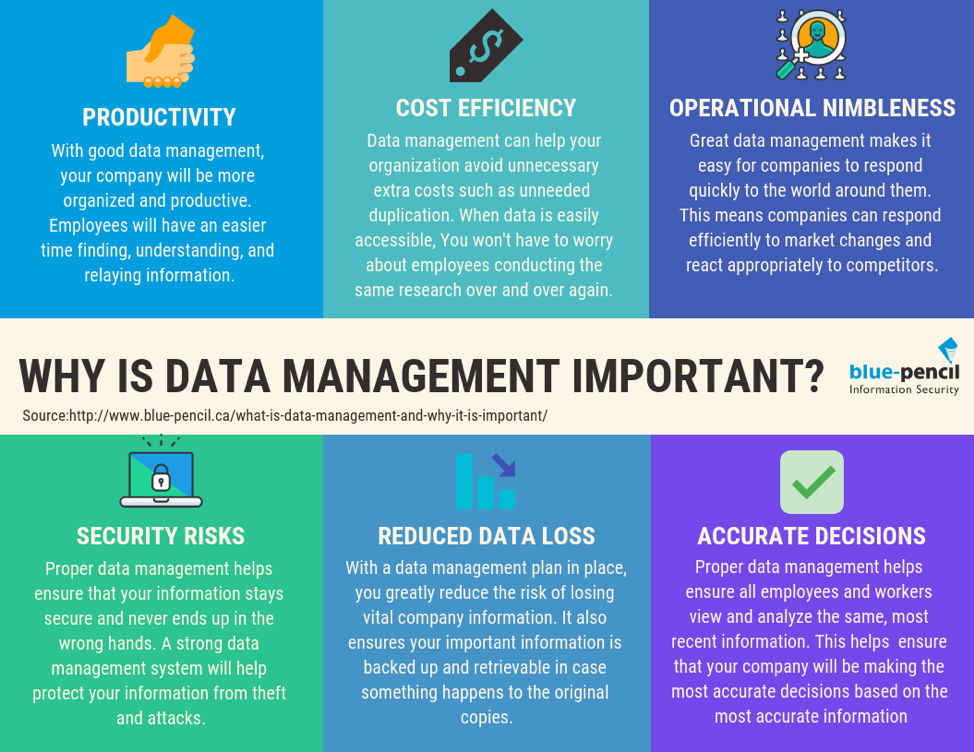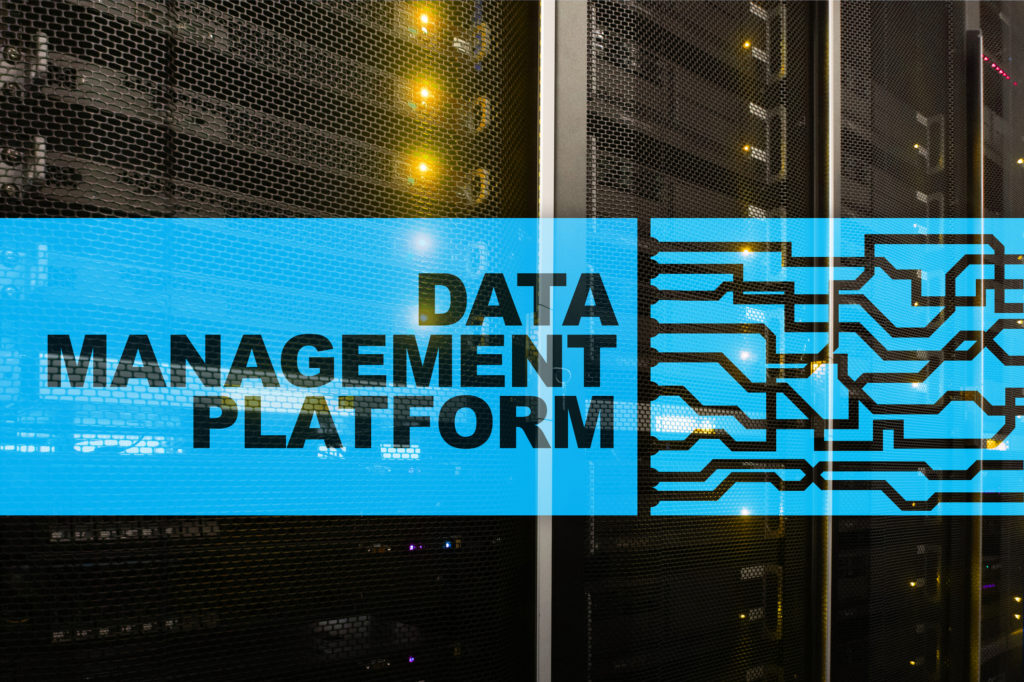Treehouse Technology Group (TTG) accepts articles from contributing authors on topics that we support. TTG believes strongly that small businesses will begin to benefit greatly from enterprise data management systems, which were previously only available to large companies. As such, small business that don’t compete on a data level will soon be beat out by the competition. Those business who employ a data strategy are leaner, innovate more often and grow faster than their competitors.
Knowing the Importance of Data Management in Business by contributing Author Christopher Roberts.
Data management is defined as: “the practice of organizing and maintaining data processes to meet ongoing information lifecycle needs.” Lately, the emphasis on data management ushered in a new era of electronic data processing, even though data management techniques and methods have been present in many industries such as logistical planning, statistics, and accounting for many years. All of these industries have grown with the emergence of enterprise computing. It is now essential to understand and know the importance of data management in business.
The Big Data market is continuously growing, and according to the latest statistics, market revenues for services and software will greatly increase in the next ten years.
In the period from 2017 to 2027, the Big Data market revenue for services and software is expected to increase from $42B to $103B, which is perhaps one of the biggest reasons for all the upcoming Big Data business initiatives.

What Does Big
Data do for Businesses?
All the above-listed statistics show that Big Data:
- Decrease expenses through operational cost efficiencies.
- Helps develop a data-driven culture.
- Provides new space for disruption and innovation.
- Creates new capabilities and services.
- Accelerates the deployment of new services.
- Launches new products and services.
- Increases revenues.
- Provides new source of revenues.
- Transforms business according to the future model of operations.
Growth of the Total Data Market
All these statistics point to the fact that the Total Data Market will double in size. This market has shown considerable increase from $60B in 2014 to $115B in 2019.
The Total Data Market is now divided into nine Total Data segments:
- Operational databases
- Analytic databases
- Reporting and analytics
- Data management
- Performance management
- Event/stream processing
- Distributed data grid/cache
- Search
- Hadoop
Effective Data Management is the Key to Success for any Business
There’s no denying that we’re living in the digital age and data is simply everything. It’s an essential asset for any business, as it represents the very foundation of information on which business owners base their decisions.
For it to be efficient and effective, it must be consistent, organized, complete, and most importantly, accurate. With the right data, any organization can develop and grow. All it needs is an effective data management system, as that’s the key to success for any business.

The importance of data management in business is evident from the fact that it can reap the following benefits:
Increased Productivity
Ease of access to data matters greatly. The bigger the organization, the more important it is. If you can access essential data with ease, your entire business becomes more productive and organized.
An enterprise management system allows employees to access any piece of information with ease, which significantly reduces the time they need to invest tin looking for that information. This is directly related to increased efficiency.
Aside from all this, ease of access also increases the ability of employees to understand and share information between them, which greatly reduces human error in return.
Smooth Workflow
Each business needs a seamlessly functioning system of operations to grow and invest in a data management system that brings your organization one step closer to that goal. Such a system is what makes a difference in modern markets and helps your business stay competitive, thereby ensuring success.
On the other hand, modern consumers don’t like to wait. If your business takes too long to respond to consumers needs, they’ll take their money somewhere else.
Therefore, investing in an effective data management system makes sure you keep your consumers satisfied, which ensures that you stay competitive.
Minimal Security Risk
There are loads of personal and business information available to anyone who knows how to access it. Internet users and organizations keep their entire lives and businesses online.
That only increases the need to protect all that data from prying eyes, which calls for maximum security. If you don’t keep your data safe, it can get stolen, fall into the wrong hands, and so on.
A good data management system protects your important data and keeps security risks at a minimum.
Affordability
An effective data management system is cost-efficient, as you will have fewer problems with data management, which saves you time and resources while preventing information duplication.
Minimal Data Loss
Losing vital business information is a terrible event for any company. However, a good data management system can prevent that from happening, as it ensures that you always have a proper backup of your data in a timely fashion.
In case of an emergency, your data management system allows you to retrieve your vital information with ease.
Improved Process of Decision-Making
The data management system keeps your entire organization up and running, ensuring that everything is in place. When every segment of your enterprise is fully operational, your process of decision-making suddenly improves and that gives a higher quality to the decisions you make.
Since decision-making plays a crucial role in your success, the improved process of decision-making helps your business evolve.

The Importance of Partnering with a Professional Data Entry Company
Outsourcing product data entry brings numerous
benefits for businesses that want to cooperate with skilled and qualified
professionals in the field. It gives businesses the following advantages:
- Freedom to focus on core competencies – when cooperating with a skilled outsource data entry provider, your business can shift its focus on core competencies while effectively maintaining your data entry project.
- Cost-efficiency – the biggest benefit any business gets from outsourcing is reduced cost of operations.
- Greater accuracy – when it comes to data entry, accuracy is vital. Outsourcing provides the highest data accuracy possible, thereby reducing the risks of a breakdown in the system.
- Greater flexibility – in the ever-evolving modern markets, a business needs to be flexible and agile, and working with an outsourcing data entry provider will ensure your business remains relevant in many ways.
Choose a Professional Business Data Processing Service Company
If you’re ready to combine forces with a professional data entry company and take your enterprise to a whole new level, you must utilize the expertise of a good business data processing services company like Data Entry Outsourced (DEO).
With several years of experience, DEO provides the highest quality data entry services at the most affordable prices.
Some of the specialties that companies like these provide include:
- Data entry
- Data mining
- Data processing
- Data conversion
- E-publication
- E-commerce
- Data updating
- Catalog management
- Data extraction
- Data cleansing
The importance of data management in business is undeniable. With the right data entry solutions, your chances of getting ahead of the curve and beating your competitors improve immensely. Take your business to a whole new level with the right data management system and make the most of your operations.
